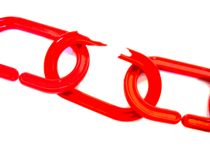“Entropy requires no maintenance,” said the noted agnostic mystic Robert Anton Wilson. But your links do.
People throw around the term entropy, to physicists’ horror. It’s hard to discuss accurately without getting into thermodynamics — fun! — but the pop-science bottom line is clear enough:
 Entropy increases. Things fall apart.
Entropy increases. Things fall apart.
Anyone who’s owned a web site for a while knows that perfectly good links often go bad. 404 bad. Weird redirects bad. Strange spammy landing pages bad. We’ve all been to older web sites on which half the links lead to some twilight zone.
Fortunately, it’s relatively easy to identify and change dead or misleading links.
Forget doing this by hand. My tool of choice is the Broken Link Checker for WordPress. The free plugin is annoyingly vigilant, allowing anyone who’s good at chores to keep their site links clean and useful.
The plugin endlessly scrolls through all of your site links. The typical alert is generated after the link hits a 404 error page. These are the geek-chow admin pages that servers display to readers when a URL can’t be found. (404 pages can be fun; here’s the one for my psychedelic music site.)
Broken Link Checker also catches busted images and YouTube videos that have gone dark. And then emails you with the news. The plugin’s box at the bottom of the WordPress dashboard also alerts blog owners to their bum links.
In many cases I quickly can locate the new URL for the content, either on the original web site or via a Bing search. Some decrepit links I simply delete, which can be done via the plugin without calling up the page file. You also can edit the link this way, very handy.
The plugin also breaks out redirects. These usually aren’t as critical as bad links, but still require action. Redirects aren’t bad in and of themselves; in a perfect world, they occur when the web site applies a 301 code to indicate a new location for the content. But other times redirects lead to unrelated content, generic archive searches, paid-content firewalls and other disheartening venues. At best, redirects gum up the Web.
A lot of redirected links can be addressed simply by taking the ride to the content’s new location, then editing your URL to reflect the updated location. That can be a waste of time, though, as some publications such as the mighty New York Times generate redirects that can’t be overridden. The plugin will let you know.
Why bother? For one thing, SEO gurus say excessive bad links and redirects signal that a site is poorly maintained. Google and Bing, which track links in and out of sites, may downgrade those with too many deadbeat links. (The quality theory applies to sites loaded with spelling and grammar mistakes as well.)
I go after bad links almost immediately. Call it an obsession (or perhaps misplaced priorities). Redirects I chase maybe once or twice a month.
People pay me to do this for their sites. I don’t blame them. Fixing a pile of links is up there with washing dishes and doing oil changes.
Entropy calls — what can we do but obey.